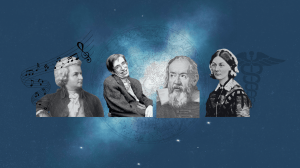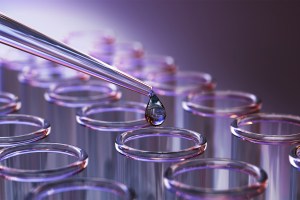Tag: Science
-
Health
Research in brief
Major differences in protocols used to determine brain death; Harvard researchers achieve stem cell milestone; Consortium links chromosome abnormality to autism disorders; Blocking HIV infection; Oral osteoporosis meds appear to reduce the risk of jaw degradation; Six new genetic variants linked to heart-disease risk factor; Gene variation may elevate risk of liver tumor in some…
-
Campus & Community
Chemistry Department creates Fieser Fellowship
Harvard University’s Department of Chemistry and Chemical Biology (CCB) has announced the creation of the Mary Fieser Postdoctoral Fellowships Program to promote the recruitment, development, and mentorship of women and underrepresented groups in areas across the chemical sciences.
-
Campus & Community
Damon Runyon Cancer Research Foundation awards fellowships
The Damon Runyon Cancer Research Foundation has named three Harvard affiliates among its 17 new fellows. The recipients of this prestigious, three-year award are outstanding postdoctoral scientists conducting basic and translational cancer research in the laboratories of leading senior investigators across the country.
-
Campus & Community
Scientist, educator Ehrenreich dies at 79
A pioneer in semiconductor materials and a Harvard professor for more than four decades, Henry Ehrenreich, Clowes Professor of Science Emeritus, died on Jan. 20, a few months before his 80th birthday. Ehrenreich served as the University’s first ombudsman and extended his academic interests to government and public policy, spending a year working with the…
-
Health
Drug helps certain brain tumor patients live longer
People who receive high doses of the chemotherapy drug methotrexate to treat a certain type of brain tumor appear to live longer than people receiving other treatments, according to research published in the Jan. 29 issue of Neurology, the medical journal of the American Academy of Neurology.
-
Health
Chimpanzees have ‘top guns’ on hunts
While hunting among chimpanzees is a group effort, key males known as “impact hunters” are highly influential within the group. They are more likely to initiate a hunt, and hunts rarely occur in their absence, according to a new study. The findings, which appear in the current issue of Animal Behaviour, shed light on how…
-
Health
Suicide risk factors consistent globally
Risk factors for suicidal thoughts, plans, and attempts are consistent across countries, and include having a mental disorder and being female, younger, less educated, and unmarried. So says new research from Harvard University and World Health Organization (WHO) World Mental Health Survey Initiative. The study examined both the prevalence and the risk factors for suicide…
-
Health
‘Where do I come from?’
Harvard graduates often return to the University to let their professors know what they’ve been up to since they finished their degree.
-
Campus & Community
Australia-Harvard Fellowships named
A biologist, a geologist, and a statistician are among the winners of the 2008 Australia-Harvard Fellowship, the Harvard Club of Australia Foundation has announced. Diversities of career stage and profession characterize this year’s list of seven new fellows.
-
Campus & Community
Cancer research pioneer Judah Folkman dies suddenly at 74
Cancer research pioneer Judah Folkman, the Andrus Professor of Pediatric Surgery and professor of cell biology at Harvard Medical School (HMS), died on Jan. 14 of a heart attack. Folkman, who was also the director of the Vascular Biology Program at Children’s Hospital Boston, was 74.
-
Health
Bonsai collection highlights age, beauty
The foliage is green and youthful, but the twisted, gnarled trunks show the trees’ age. But that’s the point, of course.
-
Science & Tech
Seabed microbe study leads to low-cost power, light for the poor
A Harvard biology professor’s fascination with seafloor microbes has led to the development of a revolutionary, low-cost power system consuming garbage, compost, and other waste that could provide light for the developing world.
-
Health
Newly discovered type of cell death may end up inhibiting tumor growth
Sometimes healthy cells commit suicide. In the 1970s, scientists showed that a type of programmed cell death called apoptosis plays a key role in development, and the 2002 Nobel Prize in physiology or medicine recognized their work. As apoptotic cells degrade, they display standard characteristics, including irregular bulges in the membrane and nuclear fragmentation.
-
Health
Slow reading in dyslexia is tied to disorganized brain tracts
Dyslexia marked by poor reading fluency — slow and choppy reading — may be caused by disorganized, meandering tracts of nerve fibers in the brain, according to researchers at Children’s Hospital Boston and Beth Israel Deaconess Medical Center (BIDMC). Their study, using the latest imaging methods, gives researchers a glimpse of what may go wrong…
-
Health
Blood stem cell’s roles could help clarify pathogenesis
No other stem cell is more thoroughly understood than the blood, or hematopoietic, stem cell. These occasional and rare cells, scattered sparingly throughout the marrow and capable of replenishing an entire blood system, have been the driving force behind successful bone marrow transplants for decades. Scientists, for the most part, have seen this as the…
-
Health
Brain systems less coordinated with age
Some brain systems become less coordinated with age even in the absence of Alzheimer’s disease, according to a new study from Harvard University. The results help to explain why advanced age is often accompanied by a loss of mental agility, even in an otherwise healthy individual.
-
Health
Increasing growth hormone release reduces abdominal fat
Treatment with an investigational drug that induces the release of growth hormone significantly improved the symptoms of HIV lipodystrophy, a condition involving redistribution of fat and other metabolic changes in patients receiving combination drug therapy for HIV infection.
-
Nation & World
The importance of early education
Forty-six years ago, a working-class town in Michigan began a program that changed lives. “Mind-blowing,” one scholar called it at Harvard last week.
-
Health
Feminist pioneers discuss women’s health policy
More than three decades after publication of the taboo-shattering book on female health, “Our Bodies, Ourselves,” activists are still struggling to bring attention to women’s health issues amid the national debate over medical insurance coverage, said one of the book’s authors and feminist pioneer Judy Norsigian.
-
Campus & Community
Sidney Coleman dies at 70
Sidney Richard Coleman, a member of the Harvard faculty for 43 years and a giant of theoretical physics, died on Nov. 18 after a five-year struggle with Parkinson’s disease. He was 70.
-
Health
Scientists identify gene responsible for statin-induced muscle pain
Statins, the popular class of drugs used to lower cholesterol, are among the most commonly prescribed medications in developed countries. But for some patients, accompanying side effects of muscle weakness and pain become chronic problems and, in rare cases, can escalate to debilitating and even life-threatening damage.
-
Health
Telling the arthropod tale of life
They had sifted through the forest floor’s leaves and dirt for days, looking for a tiny type of daddy longlegs native to New Zealand, but had little more than dirty hands to show for it.
-
Health
Selective attention most impaired during first night shift worked
Our biological propensity for keeping awake during the day and sleeping at night makes night work a challenge. Now, researchers at Brigham and Women’s Hospital (BWH) have found that attention is especially affected during the first night shift. This research appears in the Nov. 28 issue of the Public Library of Science One.
-
Health
Flavonoid-rich diet helps women decrease risk of ovarian cancer
New research out of the Channing Laboratory at Brigham and Women’s Hospital (BWH) reports that frequent consumption of foods containing the flavonoid kaempferol, including nonherbal tea and broccoli, was associated with a reduced risk of ovarian cancer. The researchers also found a decreased risk in women who consumed large amounts of the flavonoid luteolin, which…
-
Campus & Community
Publications recognize three CfA astronomers
Three astronomers at the Harvard-Smithsonian Center for Astrophysics (CfA) were recently recognized for their innovative work by three leading national magazines. The trio was selected from hundreds of scientists across the country for their leadership and achievements in their respective research fields.
-
Health
Politics of pain — from Percodan to Kevorkian
On a rainy Tuesday afternoon (Nov. 6), physicians, historians of science, and members of the general public gathered in the gymnasium at the Radcliffe Institute for Advanced Study to hear about pain.
-
Health
Obesity linked to higher prostate cancer mortality
Men who are overweight or obese when diagnosed with prostate cancer are at greater risk of death after treatment, according to a new study in the Dec. 15 issue of Cancer, a peer-reviewed journal of the American Cancer Society.
-
Health
Symposium addresses American Indian health
Sunshine Dwojak, a fourth-year Harvard Medical School student, was 26 when her mother died of heart disease, leaving behind three children. Dwojak’s mother was 48.
-
Arts & Culture
Digging history in Harvard Yard
It was crowded in the hole in Harvard Yard, with sophomore Reyzl Geselowitz and freshman Alison Liewen crouching in the square pit, elbow to elbow and more than a yard deep in Harvard’s dark earth.
-
Health
Study: Single muscle far more complex than previously believed
New research from Harvard’s Concord Field Station has shown that the common perception of a muscle as a single functional unit is incorrect and that different sections within an individual muscle actually do different work.


